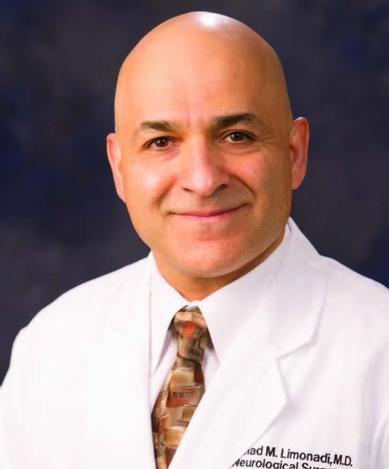Back In The Game

On May 23, 2015, McWilliams, the 60-something owner of popular Palm Desert eatery Randy’s Café, fell off his mountain bike on the Cross Trail and rolled more than 30 feet. Bruised and shaken, he nonetheless brushed himself off and got himself home, no worse for wear — or so he thought.
About a week later, however, he began noticing symptoms that were highly unusual for someone as physically fit as he is. McWilliams is a fitness expert who has competed in triathlons and trains world-class tennis players when he’s not serving up breakfast, lunch and repartee at his café between November and May.
Losing dexterity for everyday activities
“I was losing the dexterity to do everyday activities like brush my teeth, button my shirt or tie my shoes,” he says. “I’d been a phenomenal swimmer all my life but couldn’t swim the 25-meter length of my community pool. I tried throwing a ball back to a dog owner and it only went about five feet. I can usually throw a football 50 yards. I had to close my restaurant early because I was having problems with balance, walking, prepping food and carrying things.”
McWilliams admits that, given his fitness training, he initially thought he could manage his symptoms himself. But as they worsened, he sought out a physician friend, Majid Torabi, MD, a Board Certified Ear, Nose and Throat Specialist who is chief of Eisenhower’s Otolaryngology Department. Dr. Torabi immediately recognized the seriousness of McWilliams’ condition and called Dr. Limonadi.
“Even without formal neurological training or the benefit of any imaging, Dr. Torabi knew that Mr. McWilliams was rapidly becoming paralyzed, and the problem was arising from his cervical (upper) spine,” Dr. Limonadi says. “I was out of town, but trusting Dr. Torabi’s assessment of the urgency of the situation, I came back and saw Mr. McWilliams the next day.” This was June 30, 2015.

“He could barely walk into my clinic,” Dr. Limonadi recalls. “He had a spastic, robotic-type gait, and had considerable difficulty using his arms, having lost manual dexterity. He also had a difficult time getting from sitting to standing.
“On clinical examination, he had brisk [exaggerated] reflexes of the lower extremities, loss of sensory as well as motor function in both the upper and lower extremities, along with numbness and tingling,” he continues, all signs of neurological abnormality. “I understood Dr. Torabi’s concern and arranged for Mr. McWilliams to go to Eisenhower’s emergency department immediately for an MRI scan.
“As soon as the exam was completed, I viewed the results on my computer and discovered that Dr. Torabi’s suspicion and my impressions were correct,” Dr. Limonadi says. “Mr. McWilliams had severe cervical stenosis [narrowing] at multiple levels of his cervical spine. His spinal cord was compressed as a result of his injury.
“I cleared my calendar and we immediately scheduled him for surgery the following day,” he adds. “Without it, Mr. McWilliams would be facing paralysis as his loss of function was progressing rapidly, and he was at risk of spinal cord infarction [a stroke within the spinal cord or the arteries that supply it].”
Dr. Limonadi characterizes the surgery he performed as “a routine procedure but a complex one.” It involved removal of the cervical vertebral body that was compressing McWilliams’ spinal cord, along with instrumentation and fusion to stabilize the spine.
“Mr. McWilliams did well after the operation, as expected, with considerable improvement of his symptoms,” Dr. Limonadi adds. “Most importantly, he didn’t become paralyzed, which was our main concern.”
Committed to his own recovery
McWilliams undertook his physical rehabilitation with the same zeal he brings to every aspect of his life. Based on his fitness training expertise, and with Dr. Limonadi’s approval, he swam, used an upright stationary bike, and walked in the sand to help with his balance.
“I followed his instructions to a T,” McWilliams notes. “I wore a series of braces at all times to keep my neck stable.” Within two months of his surgery, McWilliams was back getting his restaurant ready to open for the season. “I did it carefully,” he says. In fact, he opened Randy’s Café a month early, and was able to work his usual seven days a week, doing everything from cooking to moving tables on the patio.
Four months after surgery, McWilliams was back to riding his mountain bike about 30 miles daily, and no longer had to wear his neck braces.
“Being athletic pays big dividends,” he says.
“People say I’m talking and more animated than I was before my surgery,” McWilliams jokes. “And they ask, ‘Who is this doctor who operated on you?’ I’ve known a lot of doctors in my life, and Dr. Limonadi is a rare bird. Anyone who comes back from vacation to help someone he doesn’t know but who is in dire need…well, he’s pretty special. Words can’t express my gratitude to him, his staff and Eisenhower for saving my life.”
As a small token of his esteem, McWilliams named the number one dish on his café menu after Dr. Limonadi, along with a write-up of the neurosurgeon.
The admiration is mutual.
“Mr. McWilliams is one of these special souls with a commanding presence, and a complex, beautiful spirit that’s deeply connected to life,” Dr. Limonadi says. “I feel blessed that I was given the skills and knowledge to prevent something so potentially disastrous from happening to him.
“His enthusiasm, being so full of life and positive, were really important to his recovery,” he adds. “Nothing can bring this man down, and nothing should.”



